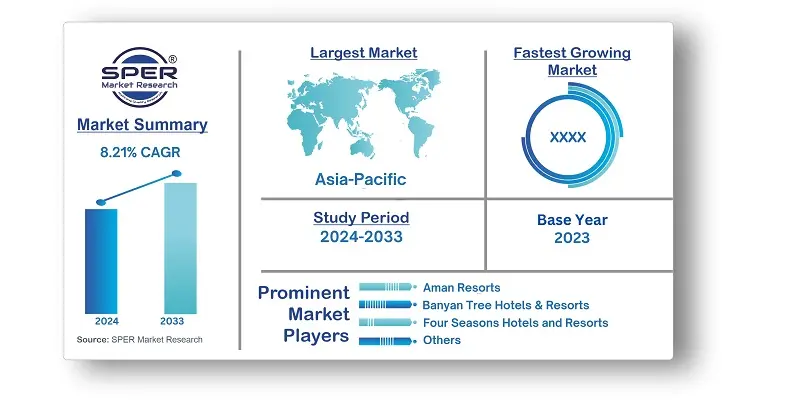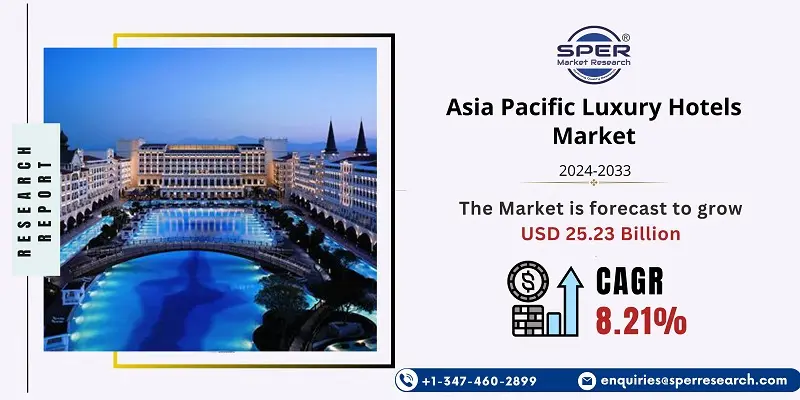
Asia Pacific Luxury Hotels Market Growth, Trends, Size, Demand, Revenue and Future Outlook
Asia Pacific Luxury Hotels Market Size- By Service Type, By Category, By Room Type- Regional Outlook, Competitive Strategies and Segment Forecast to 2033
| Published: Jul-2024 | Report ID: FMCG24135 | Pages: 1 - 153 | Formats*: |
| Category : Consumer & Retail | |||
- March 2023; At the Vibe Hotel Adelaide, its newest location in South Australia, TFE Hotels formally launched for business. The Flinders East precinct is complete with the opening of the 123 room, design led Vibe Hotel.
- January 2023; The Andaz brand made its debut in Thailand with the announcement of Andaz Pattaya Jomtien Beach by Hyatt Hotels Corporation. The Asia Pacific Luxury Hotel.


| Report Metric | Details |
| Market size available for years | 2020-2033 |
| Base year considered | 2023 |
| Forecast period | 2024-2033 |
| Segments covered | By Service Type, By Category, By Room Type |
| Regions covered | Australia, China, India, Japan, South Korea, Rest of Asia-Pacific |
| Companies Covered | Aman Resorts, Banyan Tree Hotels & Resorts, Four Seasons Hotels and Resorts, Hyatt Group, JW Marriott, Mandarin Oriental Hotel Group, Peninsula Shanghai, Ritz-Carlton Hotels, Shangri-La Hotels and Resorts, The Indian Hotels Company Limited, and Others. |
- Affluent Leisure Travelers
- Business Executives
- Celebrities and Public Figures
- Luxury Event Planners
- Destination Wedding Couples
- High Spending International Tourists
| By Service Type: | |
| By Category: | |
| By Room Type: | |
- Asia Pacific Luxury Hotels Market Size (FY’2024-FY’2033)
- Overview of Asia Pacific Luxury Hotels Market
- Segmentation of Asia Pacific Luxury Hotels Market by Service Type (Business Hotels, Airport Hotels, Suite Hotels, Resorts, Others)
- Segmentation of Asia Pacific Luxury Hotels Market by Category (Chains, Independent)
- Segmentation of Asia Pacific Luxury Hotels Market by Room Type (Luxury, Upper-Upscale, Upscale)
- Statistical Snap of Asia Pacific Luxury Hotels Market
- Expansion Analysis of Asia Pacific Luxury Hotels Market
- Problems and Obstacles in Asia Pacific Luxury Hotels Market
- Competitive Landscape in the Asia Pacific Luxury Hotels Market
- Impact of COVID-19 and Demonetization on Asia Pacific Luxury Hotels Market
- Details on Current Investment in Asia Pacific Luxury Hotels Market
- Competitive Analysis of Asia Pacific Luxury Hotels Market
- Prominent Players in the Asia Pacific Luxury Hotels Market
- SWOT Analysis of Asia Pacific Luxury Hotels Market
- Asia Pacific Luxury Hotels Market Future Outlook and Projections (FY’2024-FY’2033)
- Recommendations from Analyst
1.1. Scope of the report1.2. Market segment analysis
2.1. Research data source2.1.1. Secondary Data2.1.2. Primary Data2.1.3. SPER’s internal database2.1.4. Premium insight from KOL’s2.2. Market size estimation2.2.1. Top-down and Bottom-up approach2.3. Data triangulation
4.1. Driver, Restraint, Opportunity and Challenges analysis4.1.1. Drivers4.1.2. Restraints4.1.3. Opportunities4.1.4. Challenges4.2. COVID-19 Impacts of the Asia Pacific Luxury Hotel Market.
5.1. SWOT Analysis5.1.1. Strengths5.1.2. Weaknesses5.1.3. Opportunities5.1.4. Threats5.2. PESTEL Analysis5.2.1. Political Landscape5.2.2. Economic Landscape5.2.3. Social Landscape5.2.4. Technological Landscape5.2.5. Environmental Landscape5.2.6. Legal Landscape5.3. PORTER’s Five Forces5.3.1. Bargaining power of suppliers5.3.2. Bargaining power of buyers5.3.3. Threat of Substitute5.3.4. Threat of new entrant5.3.5. Competitive rivalry5.4. Heat Map Analysis
6.1. Asia Pacific Luxury Hotel Market Manufacturing Base Distribution, Sales Area, Product Type6.2. Mergers & Acquisitions, Partnerships, Product Launch, and Collaboration in Asia Pacific Luxury Hotel Market
7.1. Asia Pacific Luxury Hotel Market Size, Share and Forecast, By Service Type, 2020-20267.2. Asia Pacific Luxury Hotel Market Size, Share and Forecast, By Service Type, 2027-20337.3. Business Hotels7.4. Airport Hotels7.5. Suite Hotels7.6. Resorts7.7. Others
8.1. Asia Pacific Luxury Hotel Market Size, Share and Forecast, By Category, 2020-20268.2. Asia Pacific Luxury Hotel Market Size, Share and Forecast, By Category, 2027-20338.3. Chains8.4. Independent
9.1. Asia Pacific Luxury Hotel Market Size, Share and Forecast, By Room Type, 2020-20269.2. Asia Pacific Luxury Hotel Market Size, Share and Forecast, By Room Type, 2027-20339.3. Luxury9.4. Upper-Upscale9.5. Upscale
10.1. Asia Pacific Luxury Hotel Market Size and Market Share
11.1. Asia Pacific Luxury Hotel Market Size and Market Share By Region (2020-2026)11.2. Asia Pacific Luxury Hotel Market Size and Market Share By Region (2027-2033)11.3. Asia-Pacific11.3.1. Australia11.3.2. China11.3.3. India11.3.4. Japan11.3.5. South Korea11.3.6. Rest of Asia-Pacific
12.1. AMAN RESORTS12.1.1. Company details12.1.2. Financial outlook12.1.3. Product summary12.1.4. Recent developments12.2. BANYAN TREE HOTELS AND RESORTS12.2.1. Company details12.2.2. Financial outlook12.2.3. Product summary12.2.4. Recent developments12.3. FOUR SEASONS HOTELS AND RESORTS12.3.1. Company details12.3.2. Financial outlook12.3.3. Product summary12.3.4. Recent developments12.4. HYATT GROUP12.4.1. Company details12.4.2. Financial outlook12.4.3. Product summary12.4.4. Recent developments12.5. JW MARRIOTT12.5.1. Company details12.5.2. Financial outlook12.5.3. Product summary12.5.4. Recent developments12.6. MANDARIN ORIENTAL HOTEL GROUP12.6.1. Company details12.6.2. Financial outlook12.6.3. Product summary12.6.4. Recent developments12.7. PENINSULA SHANGHAI12.7.1. Company details12.7.2. Financial outlook12.7.3. Product summary12.7.4. Recent developments12.8. RITZ-CARLTON HOTELS12.8.1. Company details12.8.2. Financial outlook12.8.3. Product summary12.8.4. Recent developments12.9. SHANGRI-LA HOTELS AND RESORTS12.9.1. Company details12.9.2. Financial outlook12.9.3. Product summary12.9.4. Recent developments12.10. Others
SPER Market Research’s methodology uses great emphasis on primary research to ensure that the market intelligence insights are up to date, reliable and accurate. Primary interviews are done with players involved in each phase of a supply chain to analyze the market forecasting. The secondary research method is used to help you fully understand how the future markets and the spending patterns look likes.
The report is based on in-depth qualitative and quantitative analysis of the Product Market. The quantitative analysis involves the application of various projection and sampling techniques. The qualitative analysis involves primary interviews, surveys, and vendor briefings. The data gathered as a result of these processes are validated through experts opinion. Our research methodology entails an ideal mixture of primary and secondary initiatives.



Frequently Asked Questions About This Report
PLACE AN ORDER
Year End Discount
Sample Report
Pre-Purchase Inquiry
NEED CUSTOMIZATION?
Request CustomizationCALL OR EMAIL US
100% Secure Payment






Related Reports
Our Global Clients
Our data-driven insights have influenced the strategy of 200+ reputed companies across the globe.




















